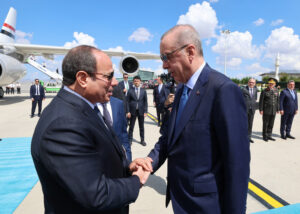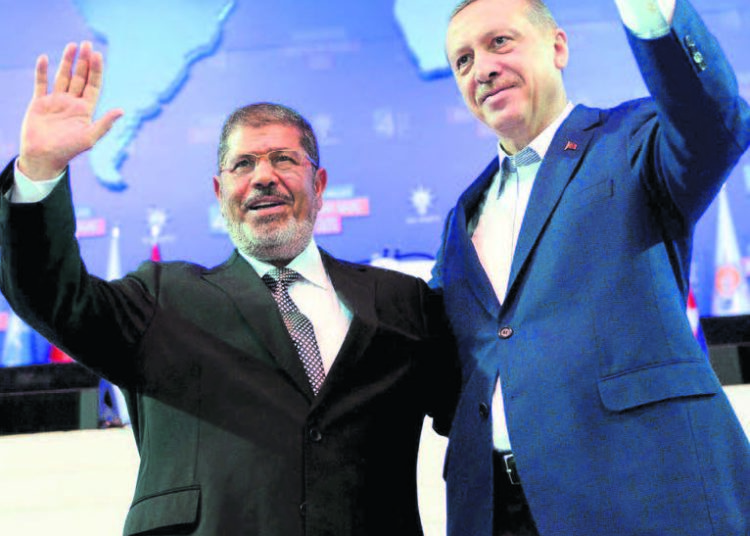Abdullah Bozkurt / Stockholm
Turkey’s Supreme Court of Appeals has overturned the conviction of Atef Shahat Abdelaal Elgendy, a senior figure in Egypt’s Muslim Brotherhood (MB), along with his co-defendant, also an MB member, who were both accused of having ties to the jihadist Islamic State in Iraq and Syria (ISIS) group.
With its ruling the highly politicized court — dominated by the government of President Recep Tayyip Erdogan and its far-right ally, the Nationalist Movement Party (MHP) — signaled that Turkey’s leadership remains intent on shielding Egyptian jihadist figures despite a recent thaw in relations with Cairo following Ankara’s earlier open support for the Muslim Brotherhood.
Elgendy was originally sentenced by the Istanbul 34th High Criminal Court to seven-and-a half years in prison for membership in a terrorist organization, namely ISIS, in February 2022, after investigators found bomb-making manuals, forged passports and suspicious lists of foreign nationals in his possession. On appeal, Istanbul’s regional court upheld the conviction in September of the same year. However, the Supreme Court of Appeals quashed that ruling in October 2024.
When counterterrorism police raided Elgendy’s apartment in 2019, they uncovered a cache of passports from Egypt and Tunisia, along with identity papers, visa stickers and official stamps. Among them was an Egyptian document in the name of Ahmed Raafat Abdou Abdelkader Mohamed — the identity Elgendy had used to enter Turkey illegally in 2016. Another Egyptian passport bore his true name, Atef Shahat Abdelaal Elgendy, that was allegedly purchased for $2,000 through intermediaries in Libya.
Investigators also catalogued a passport for a person identified only by the surname Alghozlany, bearing serial number A21075856, and Tunisian passports in the names of Firas Charif (number F763002/R763002) and Razan Charif (number F365469). Police believed these documents formed part of a toolkit designed to help operatives cycle through different identities while traveling through Turkey and beyond.
Turkey’s Supreme Court of Appeals ruling that tossed out convictions for two Muslim Brotherhood figures who were charged with terrorism:
A stamp-making machine, ink pads and blank seals — equipment similar to that used by immigration and municipal offices in many countries — were seized along with the passports. Forensic analysis indicated that the machine had been used to replicate official stamps, suggesting the existence of a broader forgery operation.
The most revealing find was a typed list of 128 foreign nationals. Each entry contained a full name and passport number, with some marked by either a plus sign (+) or a minus sign (–). Prosecutors argued this was a roster of foreign fighters, with the symbols denoting approval or rejection for safe passage and residence.
Elgendy, who presented himself as a professor of law and admitted he was wanted in Egypt, claimed the list was far more mundane: an administrative record of Egyptian dissidents applying for residence permits through diaspora associations in Istanbul. According to him, the plus and minus marks merely reflected whether applicants had submitted complete paperwork.
However, police analysts discovered that several names on Elgendy’s list also appeared in documents seized from the residence of his co-defendant, a former Egyptian law professor. The overlap suggested, at a minimum, that both men shared access to the same database.
Photos recovered from Elgendy’s phone included one showing him with a firearm in Libya, suggesting that he had fought there or collaborated with jihadist groups. An intelligence note prepared by Turkey’s counterterrorism bureau in April 2019 identified him and his associate as linked to al-Qaeda-affiliated groups. Phone records also showed him in contact with about a dozen known fighters who had traveled abroad to join jihadist organizations.
Elgendy’s co-defendant, also a law professor turned activist, arrived in Turkey on May 29, 2014. He later acquired Turkish citizenship and became active in organizations such as the Nile Humanitarian Aid Association (Nil İnsani Yardım Derneği) and the Association for International Law, Freedom and Liberties (Uluslararası Hukuk ve Özgürlük Hürriyet Derneği), which purported to assist Morsi loyalists fleeing Egypt.

Turkish authorities began investigating him after receiving intelligence from the United States. He had fled Egypt after the ouster of President Mohamed Morsi amid mass protests and a military intervention. He had served on Morsi’s election campaign team and was granted asylum in Turkey before obtaining citizenship through a decision of Erdogan’s cabinet. Turkish intelligence vetted and cleared him before his naturalization.
He insisted that the documents found on his devices were residence files and that his lists overlapped with Elgendy’s because his association once rented the same premises later occupied by Elgendy’s livestock company. He argued that he was merely assisting Muslim Brotherhood exiles in Turkey to obtain residence and citizenship.
He also revealed that his work had been part of an official assignment from the Turkish government, suggesting he may have been a clandestine intelligence asset. That role may help explain why the supreme court was lenient in overturning his conviction, possibly after intervention by Turkish intelligence.
One phone message uncovered during the investigation showed him discussing Turkish jihadist networks and responding positively to a suggestion that they needed to be “reformatted.” This raised suspicions that he was actively involved in Turkish jihadist organizations and offering advice on restructuring them.
Beyond these findings, Elgendy’s electronic devices contained some of the most incriminating files. A Word document titled “Patlayıcı Bilimi” (Science of Explosives) outlined methods for producing improvised bombs and was stored in a folder labeled “Kassam Tugayları,” directly referencing Hamas’s armed wing, the Izz al-Din al-Qassam Brigades. Audio recordings in Arabic and messaging app logs further reinforced suspicions.
Elgendy denied creating the files, claiming they had been inadvertently downloaded or transferred. He also argued that Turkish state media itself often portrays the Qassam Brigades as the legitimate military wing of Hamas — a group that Erdogan’s government characterizes as a resistance movement rather than a terrorist organization.

The Supreme Court of Appeals’ ruling does not acquit Elgendy or his co-defendant, but it orders the Istanbul 34th High Criminal Court to re-examine the evidence: the forged passports, the stamp machine, the 128-name list and the explosives manuals. Investigators insist that the evidence points to a clandestine pipeline supporting jihadists across the Middle East and North Africa. The defense continues to argue that the materials reflect nothing more than diaspora politics and bureaucratic paperwork.
The retrial will force Turkish judges to navigate a politically charged landscape. While al-Qaeda and ISIS are officially banned in Turkey — at least on paper, given the Erdogan government’s lax approach toward such groups — the Muslim Brotherhood and Hamas enjoy political backing and protection from the highest levels of government.
At stake is not only the fate of Elgendy and his co-defendant but also how Turkey handles legal cases involving Egyptian dissidents, some of whom have already been recruited as intelligence assets. The case will test whether Turkish authorities turn a blind eye when Muslim Brotherhood operatives act as conduits for recruiting fighters into al-Qaeda and ISIS. It also raises questions about how the Erdogan government can continue shielding Brotherhood figures while maintaining its fragile rapprochement with Egypt — ties that had previously collapsed over Ankara’s open support for the group.












